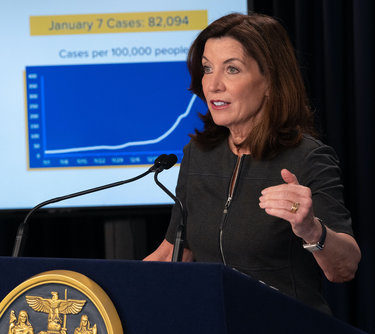Rates of kids being hospitalized outpace adults, gov urges vaccination
ALBANY COUNTY — The county executive on Friday reported 939 new COVID-19 cases — there are now 5,148 active cases in Albany County — and another death from the virus.
A man in his nineties succumbed, bringing Albany County’s COVID-19 death toll to 476.
Meanwhile, the governor held a press conference in which the acting health commissioner, Mary Bassett, said, with the surge of the Omicron variant, the rate of increase among children is faster than with adults.
Among children under 5 — too young to be vaccinated — the increase is nearly five-fold, she said, displaying charts that are included in a report she issued on Friday.
For those in the 12-to-18 age group — a group eligible for vaccination — the increase has been ten-fold.
Comparatively, for adults, the rate has gone up between two and two-and-a-half fold.
Although a smaller number of children than adults are being hospitalized with the virus, the number of hospitalized children has gone from 85 at the beginning of December to 571 now.
“The vast majority of children who are hospitalized are unvaccinated ….,” said Bassett. “Over 90 percent of the very young [hospitalized] group, 5- to 11-year-olds have not been vaccinated; that needs to change.”
Only about 20 percent of children in that age group have been vaccinated.
“Those children who are hospitalized do not have to be scared, frightened, lying in a hospital bed; they do not have to be there,” said Governor Kathy Hochul, urging vaccination.
Hochul on Friday announced new guidance recommending booster doses for all New Yorkers ages 12 and older.
The guidance, following action by the Centers for Disease Control and Prevention, recommends that people, including the newly authorized 12- to15-year-old age group, who received the Pfizer-BioNTech vaccine should receive a booster dose at least five months after their second dose; the previous recommended interval was at least six months.
In addition, moderately to severely immunocompromised 5- to 11-year-olds can receive an additional primary dose of the Pfizer-BioNTech vaccine 28 days after their second dose. At this time, only the Pfizer-BioNTech COVID-19 vaccine is authorized and recommended for children ages 5-11.
The CDC on Friday also recommended the same change to a five-month booster interval for the Moderna vaccine, which is authorized only for people 18 years and older.
Hospitalizations
Albany County Executive Daniel McCoy reported on Friday that there were 11 new hospitalizations of county residents since Thursday, and there are now 102 county residents hospitalized with the coronavirus — a net increase of three. Sixteen of those hospital patients are in intensive-care units, up from 12 on Thursday.
“Unfortunately, the number of our residents in ICUs with the virus is trending up as well, now at the highest level since February 12,” said McCoy in his Friday release.
“Many of these hospitalizations are unnecessary, because we know the vaccines are safe and they significantly reduce the chances of serious illness after contracting COVID,” McCoy went on. “It’s my hope that we can get even more people vaccinated and get even more boosters out and into arms, especially for the younger population.”
At her Friday press briefing in New York City, Hochul reported on the numbers of people who are hospitalized because of severe COVID as opposed to the 42 percent statewide who were hospitalized for other reasons and tested positive for COVID-19 once in the hospital.
In New York City, Hochul said, it’s about 50-50. “So, half of the hospitalizations in New York City are someone who needs to be there because of the severity of their COVID situation and the other half are there for other reasons,” she said.
Upstate, like Central New York, she said, “79 percent are admitted due to real COVID” while 21 percent “happened to be there for another reason and test positive,” she said.
Steven Corwin, chief executive officer of New York Presbyterian Hospital, spoke through video at the press conference, saying, “We’re about 20 percent higher than we were last year at this time, but much less in the way of cases in our ICUs and much less in the way of cases requiring a ventilator, so we’re very thankful for that.
“Of the cases in the hospital, as you mentioned, about 50 percent are admitted with COVID and 50 percent admitted for COVID. Of the patients in the hospital, 50 percent are unvaccinated or partially vaccinated and 50 percent have two doses of the vaccine.”
He also said it is “very, very rare to see somebody admitted who’s had a booster.”
While staffing, Corwin said, “has been tight,” because Omicron “appears to be less severe,” staff members who have been infected can return to work sooner.
“We think, with our modeling, that the peak will happen next week,” Corwin said.
Hochul made a plea that people with mild symptoms not go to hospital emergency rooms to get tested. “You can handle a runny nose,” she said. “You can handle your throat being a little bit sore, a little bit of cough. Just treat it as if you have the flu, follow the protocols, but please don’t overburden our emergency rooms.”
St. Peter’s Health Partners Chief Medical Director of Acute Care Thea Dalfino made a similar plea to Albany County residents last week.
“We’re being overrun right now in our emergency departments with patients coming in with very mild symptoms, or some with no symptoms, requesting COVID testing,” she said. “So we’re making a plea to the community …. Our emergency departments really are for the sickest patients,” Dalfino said.
She also said, “We’re encouraging those who have mild symptoms, you may not even need to go get tested. We want to be able to have our testing supplies for those who are sickest and that we could potentially treat.”
Hochul said on Friday that the state would be dispensing COVID-19 tests to hospitals who may set up testing stations in parking lots to keep mildly ill patients from clogging emergency rooms.
Nursing homes
“And we’re starting to see an increase in cases in our nursing homes, as much as we’ve done to protect them with the vaccinations, the booster shots,” said Hochul at Friday’s press briefing.
So now we’re going to be making sure that when visitors do come in, that they have to wear a better mask. They have to wear a surgical type mask and they have to have a negative COVID test within 24 hours.”
Hocul said, because of federal regulations, the state cannot require visitors to be vaccinated.
“This will spread like wildfire,” she said of infections in nursing homes. “It is starting to in some places, and we’re getting a real clear view of what’s going on, but we believe that the visitors are a point of vulnerability for us. The workers, the patients getting vaccinated, that’s great.”
Starting Wednesday, all nursing-home visitors must wear surgical-type masks and must present upon entry a COVID negative test taken within 24 hours of their visit. Hochul further noted that 952,000 tests and 1.2 million masks are being delivered to nursing homes late this week into next.
Hochul on Friday also announced her plan to require that all covered health-care workers previously required to receive a COVID-19 vaccination under the health department’s Aug. 26 emergency regulation must also now receive a COVID-19 booster dose within two weeks of becoming eligible, absent a valid medical exemption.
Consistent with the Aug. 26 emergency regulation, there is no test-out option. Following review and approval by the Public Health and Health Planning Council at its emergency meeting on Tuesday, the emergency regulation will be filed with the Department of State, making the regulation effective.



